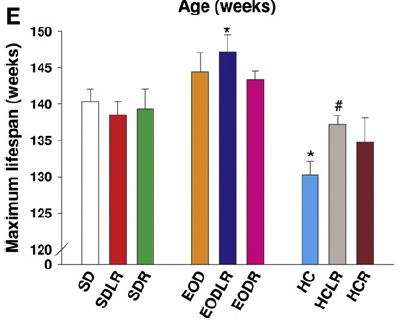All:
The Ames and Snell long-lived dwarf mice get that way because a pituitary defect which leads to low GH and IGF1; it also, however, leads to very low TSH, with the result that they have low thyroid hormones and thus low thyroid hormone signaling. CR rodents and human and nonhuman primates have a different but FUNCTIONALLY similar pattern: high TSH but normal (or low-normal) T4, combined with quite low bioactive T3, is what is observed in CR, suggesting a regulated 'altered setpoint' in the CR state that still reduces bioactive T3.
About this time last year, Barzilai's group reported that "Extreme Longevity is Associated with Increased Serum Thyrotropin" in long-lived families of Ashkenazi Jews.(1) Specifically, they had high TSH, but NORMAL T4, with an inverse CORRELATION between the 2 hormones, suggesting a state of "resistance" to TSH and possibly a kind of functional hypothyroidism; unfortunately, they didn't measure T3 (let alone free T3 or rT3) to get a more comprehensive picture. As the authors state,
This of course sounds similar to the CR findings.The TSH population shifts to higher concentrations with age appear to be a continuum that extends even to people with exceptional longevity. The inverse correlation between TSH and FT4 in our populations suggests that changes in negative feedback may contribute to exceptional longevity.(1)
A new study (4) has now reported functionally similar (and if anything, even more suggestive) findings in the Leiden Longevity Study. This is a cohort study of the middle-aged offspring of parents who are both nonagenarians, and have nonagenarian siblings, which uses their middle-aged partners as the reference group (since their diets and lifestyles will be pretty closely matched). They found that:
And, although weaker because in younger-old people or because of weaker associations, several previous studies had also come to similar conclusions. (2) reported that in the general population of individuals aged 85-89, "Plasma levels of thyrotropin and free thyroxine were not associated with disability in daily life, depressive symptoms, and cognitive impairment at baseline or during follow-up. Increasing levels of thyrotropin were associated with a lower mortality rate that remained after adjustments were made for baseline disability and health status". (3) found that they could predict "all-cause and cardiovascular mortality in elderly people from one low serum thyrotropin result [in] a 10-year cohort study" of people 60 and over.When compared with their partners, the group of offspring of nonagenarian siblings showed a trend toward higher serum thyrotropin [TSH] levels (1.65 vs 157 mU/L, p = .11) in conjunction with lower free thyroxine [T4] levels (15.0 vs 15.2 pmol/L, p = .045) and lower free triiodothyronine [T3] levels (4.08 vs 4.14 pmol/L, p = .024). Conclusions: Compared with their partners, the group of offspring of nonagenarian siblings show a lower thyroidal sensitivity to thyrotropin. These findings suggest that the favorable role of low thyroid hormone metabolism on health and longevity in model organism is applicable to humans as well.(4)
Again, this points to the low bioactive thyroid status induced in humans on CR being linked to the potential for extreme longevity in our species, providing another lightly-penciled "check" on the list of likely signs that CR will retard aging in humans.
References
1. Atzmon G, Barzilai N, Hollowell JG, Surks MI, Gabriely I. Extreme Longevity is Associated with Increased Serum Thyrotropin.
J Clin Endocrinol Metab. 2009 Apr;94(4):1251-4. Epub 2009 Jan 21. PMID: 19158193
2. Gussekloo J, van Exel E, de Craen AJ, Meinders AE, Frölich M, Westendorp RG.
Thyroid status, disability and cognitive function, and survival in old age. JAMA.
2004 Dec 1;292(21):2591-9. PubMed PMID: 15572717.
http://jama.ama-assn...ull/292/21/2591
3. Parle JV, Maisonneuve P, Sheppard MC, Boyle P, Franklyn JA. Prediction of all-cause and cardiovascular mortality in elderly people from one low serum thyrotropin result: a 10-year cohort study. Lancet. 2001 Sep 15;358(9285):861-5.
PubMed PMID: 11567699.
4. Rozing MP, Westendorp RG, de Craen AJ, Frölich M, Heijmans BT, Beekman M, Wijsman C, Mooijaart SP, Blauw GJ, Slagboom PE, van Heemst D; on behalf of the Leiden Longevity Study (LLS) Group. Low Serum Free Triiodothyronine Levels Mark Familial Longevity: The Leiden Longevity Study. J Gerontol A Biol Sci Med Sci. 2009 Dec 16. [Epub ahead of print] PubMed PMID: 20018826.





















































